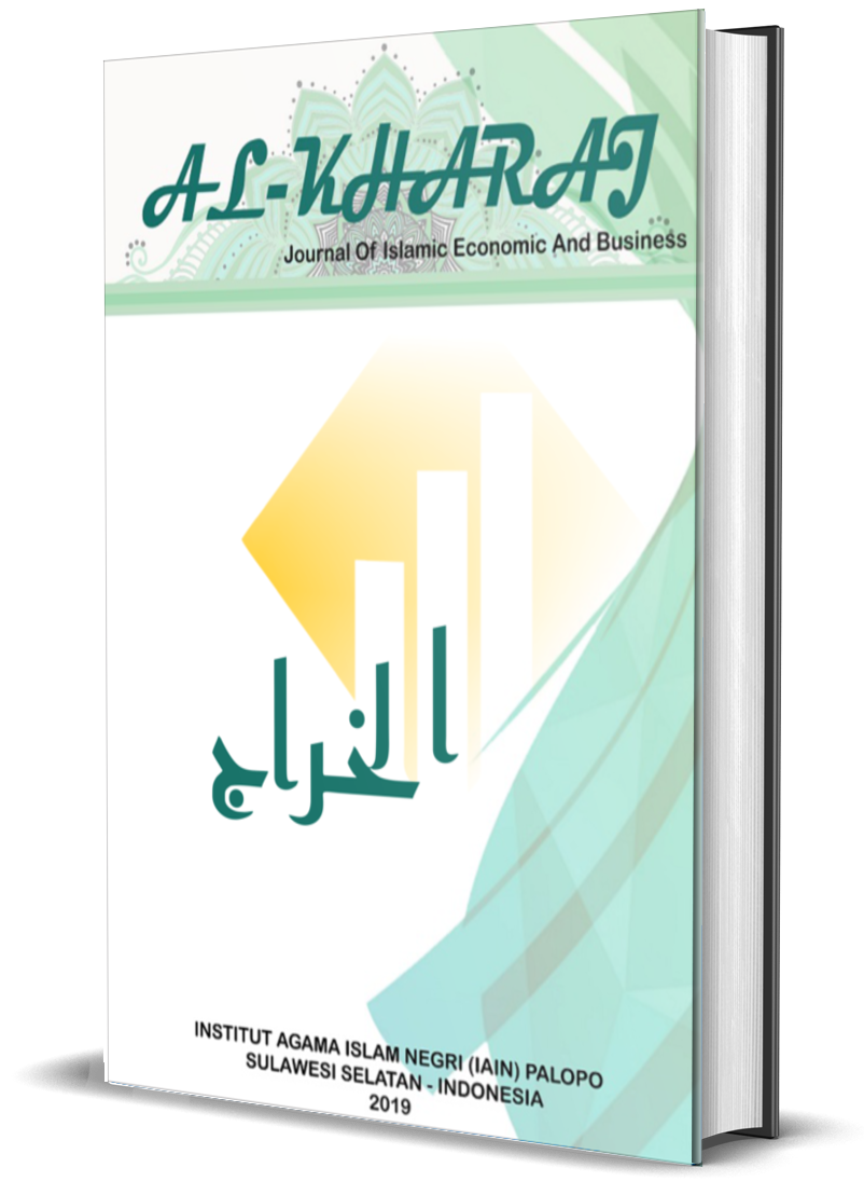Management of Ramadhan Bazaar in Empowering the Community's Economy on the Waqf Land of the Baitul Khoir Grand Mosque in Tulungagung
DOI:
https://doi.org/10.24256/kharaj.v7i2.7226Keywords:
Keywords: Management; Productive Waqf; Ramadan Bazaar; Economic Empowerment.Abstract
This article discusses the management of the Ramadan Bazaar held on the waqf land of the Baitul Khoir Grand Mosque in Tulungagung, as a means of empowering the local Muslim community. The bazaar serves not only religious and social functions but also acts as a productive initiative to optimize waqf assets for community welfare. Managed through systematic planning, organizing, implementation, and controlling stages, this activity represents a practical application of productive waqf. This study employs a qualitative descriptive method with a case study approach. The data collection technique involved structured interviews with mosque administrators and business actors involved in the bazaar, as well as the documentation of ongoing activities. The results indicate that the Ramadan Bazaar has a positive impact on the local economy, while also strengthening the mosque’s social and spiritual role. However, challenges remain in management and program sustainability. The study recommends a productive waqf-based bazaar management model as an alternative strategy for mosque-based economic empowerment, emphasizing the need for collaboration among mosque administrators, the community, and supporting institutions.
References
A.Riawan, A. (2010). Menggagas Manajemen Syariah: Teori dan Praktek The Celestial Management (M. E. Nasution (ed.); I). Salemba Empat.
Abrista, A. &. (2021). Strategi Masjid dalam Pemberdayaan Ekonomi Umat Di Masjid Al Muhajirin Bogor. AL-URBAN: Jurnal Ekonomi Syariah Dan Filantropi Islam Volume 5 (2), 2021, 5(2), 1–14. https://doi.org/10.22236/alurban
Afisna, F. A., Yaswirman, Y., & Yasniwati, Y. (2023). Pengelolaan Tanah Wakaf untuk Usaha Produktif dalam Kesejahteraan Sosial oleh Nazhir Wakaf Menurut Undang-Undang No. 41 Tahun 2004 Tentang Wakaf. UNES Law Review, 6(1), 1324–1334.
Aminol, R. A. (2021). Manajemen Ziswaf (N. A. Rahma (ed.); satu). PT. Literasi Nusantara Abadi Grup.
Arikunto, S. (2006). Prosedur Penelitian Komunikasi. In Bandung: PT Rineka Cipta Publishing. Rineka Cipta.
Bin Abd. Ghani, A. H., & Bin Aziz, M. F. (2023). Productive Waqf Asset Management based on Primary Scale and Implications for Community Welfare. Management of Zakat and Waqf Journal (MAZAWA), 5(1), 85–104. https://doi.org/10.15642/mzw.2023.5.1.85-104
Damayanti, A. R., Aluf, S., Yunus, N. A., Rahman, M. F. F., Rukmana, D. S., & Suhayat, Y. (2023). Konsep Wakaf dalam Ilmu Manajemen. Journal of Creative Student Research (JCSR), 1(4), 1–21.
Devi, A. R. O. (2021). pengelolaan wakaf tanah masjid jami’ Darussalam Desa Jatipayak kecamatan Modo Kanupaten Lamongan untuk meningkatkan perekonomian Masyarakat. 4(November), 380–393.
Djunaidi, A. T. A.-A. (2007). Menuju Era Wakaf Produktif (Miftahussurur (ed.); Keempat). Mumtaz Publishing.
Effendi, B., & Saifudin, A. G. (2022). Optimalisasi Fungsi Masjid Sebagai Sarana Dakwah dan Pemberdayaan Ekonomi Umat Volume 2 Number 2 2022. JIEF-Journal of Islamic Economics and Finance, 2(2), 12–23. http://e-journal.iainpekalongan.ac.id/index.php/jief/issue/current
Fatoni, K. M. (2025). Wawancara.
Ghufron, A., M. (2002). Fiqih Muamalat Kontekstual. Kencana Prenada Media Groub.
hafidhuddin, didin, H. T. (2003). Manajemen Syariah dalam Praktik (Pertama). Gema Insani Press.
Hartono, R., & Lestari, C. (2023). Analisis Manajemen Pengelolaan Aset Wakaf Mushola Nur Ikhlas Kelurahan Pulokerto Kecamatan Gandus Kota Palembang. Jurnal Ekonomi Dan Bisnis Digital, 3(02), 298–309. https://jurnal.ittc.web.id/index.php/jebd/article/view/485%0Ahttps://jurnal.ittc.web.id/index.php/jebd/article/download/485/446
Hidayat, S. dan S. (2022). Metodologi Penelitian. CV. Mandar Maju.
Kudus, R., Ulum, F., Maria, E., & Jamal, M. (2024). Optimalisasi fungsi Masjid sebagai pusat kegiatan sosial dan keagamaan. 1(3), 187–194.
Kyai Marju’i. (2025). Wawancara.
Masriyah, S. (2024). Peran Wakaf Produktif Dalam Kesejahteraan Masyarakat. Jurnal Ilmiah Ekonomi Islam, 10(1), 627. https://doi.org/10.29040/jiei.v10i1.12064
Moleong, L. J. (2007). Metode Penelitian Kualitatif (Issue Metode Penelitian Kualitatif). In PT Remaja Rosda Karya (Vol. 2, Issue October). PT Remaja Rosdakarya.
Mukhlisin Muzarie. (2010). Hukum perwakafan dan implementasinya terhadap kesejahteraan masyarakat (implementasi wakaf di pondok modern darussalam gontor). Kementerian Agama RI.
Munawar, W., & Mufraini, M. A. (2021). Productive Waqf, Economic Empowerment, and Public Welfare: Evidence from Benefit Recipients at Daarut Tauhiid Waqf Institution. INFERENSI: Jurnal Penelitian Sosial Keagamaan, 15(1), 1–24. https://doi.org/10.18326/infsl3.v15i1.1-24
Nisa, R., Gazali, A., & Anafarhanah, S. (2022). Manajemen Sumbrdaya Nadzir. Kajian Manajemen Dakwah, 4(41). https://doi.org/1010.24014/idarotuna.v2i2.Analisis
Nurjihan, N., Lail, M. N., & ... (2023). Tata Kelola dan Kelembagaan Wakaf. JOSEE: Journal of …, 01(01), 6–15. https://ejournal.mannawasalwa.ac.id/index.php/josee/article/view/173%0Ahttps://ejournal.mannawasalwa.ac.id/index.php/josee/article/download/173/76
Rahmatillah, R., Yasir yusuf, M., & Sari, N. (2022). Pengelolaan Wakaf Produktif Di Kabupaten Pidie Provinsi Aceh (Tantangan Dan Kendala). Journal of Sharia Economics, 3(1), 34–48. https://doi.org/10.22373/jose.v3i1.1607
Rasyid, A., Tsahbana, M., & Nurrahman, M. Y. (2023). Fungsi Masjid Sebagai Tempat Ibadah Dan Pusat Ekonomi Umat Islam. Religion : Jurnal Agama, Sosial, Dan Budaya, 1(4), 374–383. https://maryamsejahtera.com/index.php/Religion/article/view/241
Ridwan, M. (2021). Waqf institutions as a framework for social enterprises in Islam. International Journal of Social Science and Human Research, 04(07), 1805–1811. https://doi.org/10.47191/ijsshr/v4-i7-33
Rusanti, E., Sofyan, A. S., & Syarifuddin, S. (2021). Analysis Concept of a Mosque-Based Community Economic Empowerment Strategy at the Islamic Center Dato Tiro Bulukumba. JESI (Jurnal Ekonomi Syariah Indonesia), 11(1), 41. https://doi.org/10.21927/jesi.2021.11(1).41-50
Syuhada, W., Mamun, S., Midisen, K., & Ahmad, A. N. (2024). Optimalisasi Bazar Masjid sebagai Katalisator Pemberdayaan UMKM : Studi Kasus di Perumahan Sukaraya Indah Bekasi. 09(02), 447–460. https://doi.org/10.37366/jespb.v9i02.1912
Tamrin, M. A. (2025). Wawancara.
Yusniza, A. fajar. (2025). Wawancara.
Zahara, A. W., Alifa, H. L., Makfi, M. M., & Pendahuluan, A. (2021). Suciati Saliman Sleman Yogyakarta. 3(1), 383–394.
Zahra, Khairul; Saleh, M. (2024). Implementasi Pengelolaan Aset Wakaf Dalam Perkembangan Ekonomi Dan Kesejahteraan Masyarakat Di Desa Besilam. JEKSya: Jurnal Ekonomi Dan Keuangan Syariah, 3(1), 792–805.
Downloads
Published
How to Cite
Issue
Section
Citation Check
License
Copyright (c) 2025 Siti Kalimah, M. Ali Tamrin

This work is licensed under a Creative Commons Attribution-ShareAlike 4.0 International License.
Authors retain copyright and grant the journal right of first publication with the work simultaneously licensed under a Creative Commons Attribution-ShareAlike 4.0 International License. In line with the license, authors are allowed to share and adapt the material. In addition, the material must be given appropriate credit, provided with a link to the license, and indicated if changes were made. If authors remix, transform or build upon the material, authors must distribute their contributions under the same license as the original.









